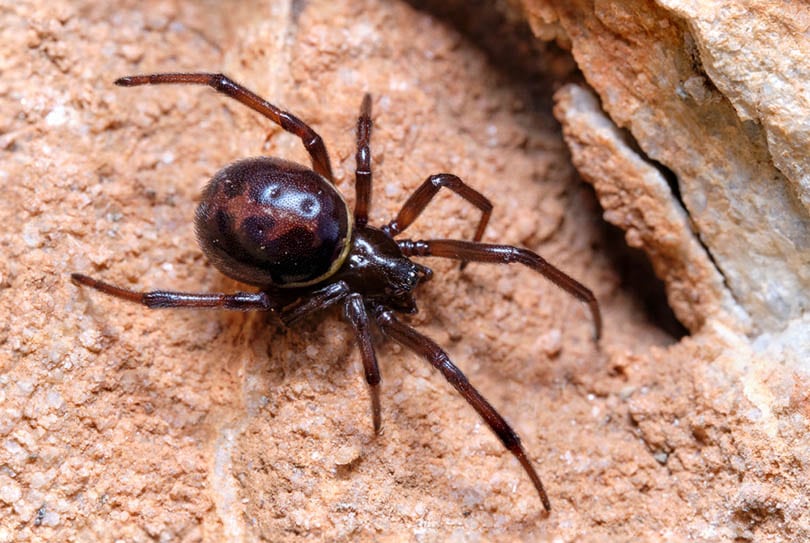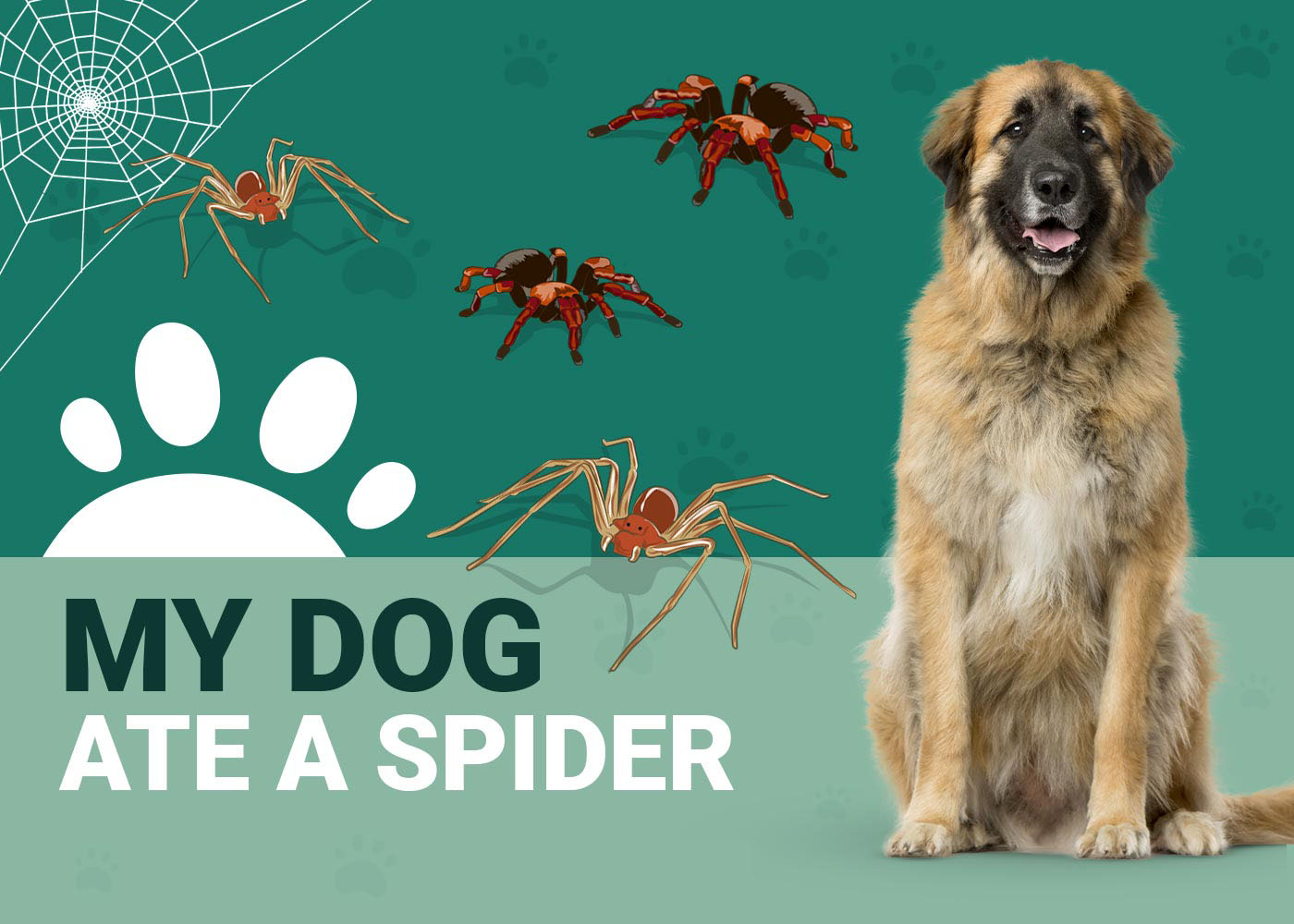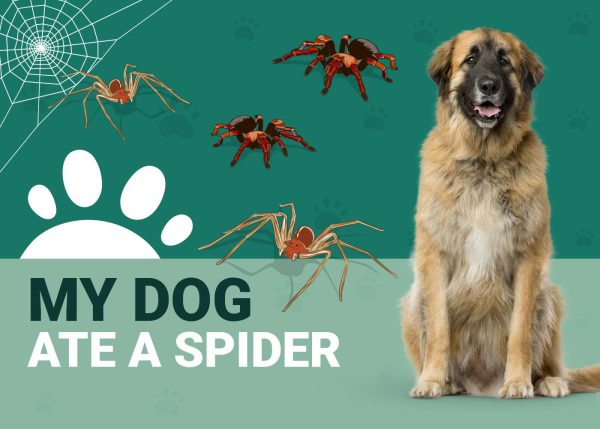There are thousands of different species of spiders around the world, and only some of these spiders are known for having medically significant venom that can harm dogs. It’s not uncommon for dogs to eat or bite insects like flies that bother them, but it can be worrisome if your dog eats a spider.
It can be even more worrying if you do not know what type of spider your dog has eaten. If you have seen or suspect that your dog was bitten by a spider species with significant venom risk you should contact your veterinarian straight away for advice. Spider bites are the main cause of concern in instances where dogs have eaten a spider.
What to Do If Your Dog Ate a Spider
- If you know that there are venomous spiders around your property such as the black widow or brown recluse you should phone your veterinarian straight away for advice.
- Closely monitor your dog for any signs of abnormal behavior after ingestion.
- Do not attempt any home remedies without guidance from a veterinarian.
- If you are unsure of the spider species and are concerned about your dog you should call your veterinarian for advice.
If your dog has eaten a common house spider that is not known to have medically significant venom, it is not usually a cause for concern. These types of spiders are common for dogs to eat, and their fangs are often too small to penetrate your dog’s skin.1
It is another story if your dog has eaten a spider with medically significant venom, and you will need to phone or take your dog to a veterinarian. The veterinarian might want you to monitor your dog at home for any signs, or to take them in for a check-up to be on the safe side.
It is usually the bite of a spider that is a cause for concern, not necessarily the ingesting of the spider itself. This is because spiders are venomous, and their venom can only cause problems through a bite where venom is injected into your dog.
If you saw the spider before your dog ate it, then a description of it may help your veterinarian with decision making.
Be on the lookout for signs that your dog has been bitten by a spider, such as those listed below.
PangoVet. It’s an online service where you can <b>talk to a vet online</b> and get the personalized advice you need for your pet — all at an affordable price!
</p>
<div class="su-button-center"><a href=https://www.dogster.com/dog-health-care/"https://pangovet.com/?utm_source=dogster&utm_medium=article&utm_campaign=dog_eat_drink%22 class="su-button su-button-style-default" style="color:#FFFFFF;background-color:#FF6600;border-color:#cc5200;border-radius:9px;-moz-border-radius:9px;-webkit-border-radius:9px" target="_blank" rel="nofollow"><span style="color:#FFFFFF;padding:0px 24px;font-size:18px;line-height:36px;border-color:#ff944d;border-radius:9px;-moz-border-radius:9px;-webkit-border-radius:9px;text-shadow:none;-moz-text-shadow:none;-webkit-text-shadow:none"> Click to Speak With a Vet</span></a></div></div></div>"}" data-sheets-userformat="{"2":513,"3":{"1":0},"12":0}"> If you need to speak with a vet but can’t get to one, head over to PangoVet. It’s an online service where you can talk to a vet online and get the personalized advice you need for your pet — all at an affordable price!

Signs Your Dog Has Been Bitten by a Spider
- Swelling in the affected area
- Redness and inflammation at the bite wound
- Respiratory issues
- Difficulty walking or standing
- Tissue necrosis at the bite wound
- Seizures or tremors
- Increased heart rate
- Weak pulse
- Fever
- Excess drooling
- Vomiting
- Muscle twitching
A spider bite from a spider that does not have medically significant venom may cause mild redness and irritation, along with itching of the affected area. Dogs that are allergic to the particular spider they have ingested will have more worrisome signs that require immediate veterinary treatment.
Are Spiders Venomous or Poisonous?
The reason it is so important to check if your dog has been bitten by a spider before eating it is that spiders are venomous and not poisonous. If a spider was poisonous, it means your dog would show symptoms of poisoning through ingestion. In the case of spiders—some of which are venomous —your dog would show signs of toxicosis through the spider’s bite instead.
The majority of spiders have venom stored in glands near the spider’s fangs. This venom is mainly used for subduing their prey which consists of insects and sometimes small animals.
Some spiders do not inject their venom when biting out of defense like they would when being eaten by a dog. It is best to be on the safe side and assume that your dog may have been bitten by the spider since this is possible if the spider tried to defend itself.
Most spider bites are not harmful to dogs, however those of the black widow and brown recluse should be taken seriously. Since it is difficult for many people to safely identify the differences between spiders with medically significant venom and spiders without, it is better to discuss with your veterinarian to be on the safe side.

Why Did My Dog Eat a Spider?
Dogs are naturally curious and may eat spiders and insects now and then. Dogs may play with spiders or try to eat them out of curiosity without knowing that the spider can be dangerous to them.
If you find your dog playing with a spider, move your dog to a safer area until you can move the spider. Once your dog is safe, relocate the spider to a safer area where it cannot harm your dog.
My Dog Ate a Black Widow Spider, Now What?
Spiders such as female black widows from the Latrodectus genus are known for having neurotoxic venom that can be fatal to your dog. If your dog has been bitten by a black widow spider or has ingested it and is likely to have been bitten by one, it is seen as a medical emergency.
Your dog should be taken to the nearest veterinarian hospital right away.

Conclusion
Your dog eating a spider is rarely a cause for concern unless they have been bitten by a spider with medically significant venom such as a black widow or brown recluse. Spiders are not poisonous, so ingestion alone will not release the spider’s venom into your dog’s body.
However, since it is common for spiders to bite a dog before or while it is being eaten, talking to a veterinarian is always a good idea. This is especially important if you cannot confidently identify the spider that may have bitten your dog.
See also:
- My Dog Keeps Eating Flies, What Should I Do? Vet Reviewed Facts & FAQ
- My Dog Ate a Rose, What Should I Do? Vet-Reviewed Facts, Complications & FAQ
- My Dog Ate a Squirrel: Should I Be Worried? Our Vet Takes a Look












